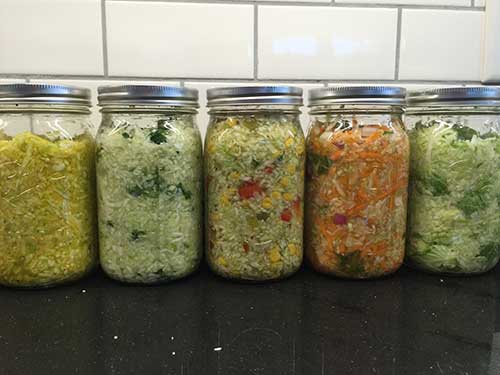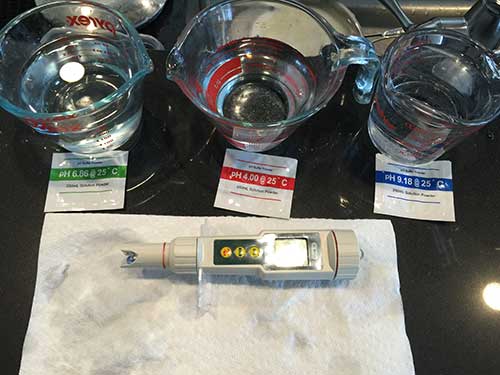Author Note: This is the fifth in a series of essays about starting a small food business in Virginia. This article was written in May, 2016. Future essays how the regulatory process turned out and other topics that I have not yet written about are forthcoming. I hope you enjoy the articles and feel free to express opposing and supporting opinions.
The articles that have been written so far are:
1. Starting a Small Business in Virginia
2. Starting a Small Business in Virginia – The Krauts
3. Starting a Small Business in Virginia – The Regulations – Part 1
4. Starting a Small Business in Virginia – The Regulations – Part 2
5. Starting a Small Business in Virginia – The Investment
How naïve I have been! With my head hidden under my hand I am embarrassed to show my readers my initial cost estimate. In January and February, I put together a spreadsheet of my estimated one-time outlays and now in May I shudder at my innocence. Here it is:

In my early career I completed half of an MBA, as well as a Masters in Systems Engineering. I was pretty confident I could get close to the costs with a little effort but I was aware that many new businesses underestimate their initial costs. My estimate of $2050 was woefully inadequate as it turns out.
I divided my expenses up into the following categories: Regulation, Equipment, Groceries, Marketing, and Administrative. The big surprise was the cost of all of my equipment. By the end of April, it had exceeded $2200. The biggest cost was the ceramic fermenting crocks. I used Mason jars to develop my recipes, but needed to be able to make large batches of sauerkraut. The single 5-liter and two 15-liter crocks cost over $500. I really underestimated my costs there. An unexpected cost was the refrigerator we needed to store cabbage and finished sauerkraut. That was also around $500. I had expanded my product line to include ginger cookies and date and nut bars, and so purchased full sized baking sheets and silicone liners. The glass jars in which I will place the kraut cost $1.70 each causing me to rethink how I will package the sauerkraut. I decided to use the glass jars for retail sales and to bring the sauerkraut in bulk containers to the farmers markets so that I can use less expensive plastic containers. However, this decision will lead to more costs as I will need to develop labels for the new containers.
Regulation costs included the cost of the Better Process Control School course ($400), the food safety course I took at the Eastern Shore Community College ($231.50), and the establishment of the company under which I operate ($252.36). Not included is the cost I am incurring ($260) by the requirement to have Virginia Tech test 42 sauerkraut samples. So far, I’ve spent $983.86 on Commonwealth regulatory items. An interesting item here is my original intent to use LegalZoom to set up the LLC. I went through the LegalZoom steps to create a LLC, but the cost was way too high. Instead, I set up the company through a local attorney.
Groceries to get my first cookie, bar, and sauerkraut production batches cost $569.16. This included a 40-pound container of organic virgin coconut oil, a case of Hatch Fire-Roasted Mild Chilies, spices, and the famous 80-pounds of organic cabbage. Although the cabbage costs are not expensive for the sauerkraut, the organic spices and chilies are very expensive.
In February I held a focus-group tasting of the krauts and bars to determine if I should proceed with the company. The tasting was held at the Cape Charles Coffee House and was a lot of fun. Another marketing costs were the cost of a banner for the Cape Charles Farmers Market.
Administrative costs were the purchase of QuickBooks to manage my expenses and the rental of a Post Office box.
Here are my expenses so far:

I underestimated my costs by more than 100%! I am embarrassed to report this to my readers, even though there only seem to be a few. For the next few weeks you will find me skulking around town hoping that those I run into have not read this article.


Karen,
Thanks for sharing. I wouldn’t be too embarrassed by your underestimate. Sometimes the only way to really find out the costs is to do it. There seems to be a fair amount of interest in the community kitchen concept, as witnessed by Cape Charles backing that initiative for the Middle School. I think you are doing some of the research needed by those who would use such a facility. I wish you good luck in your venture.
Stadiums, bridges, water treatment plants, town maintenance, ships, planes, trains, rockets, weapons systems and all manner of government programs all have been known to have huge cost overuns. And these are ostensibly formed by teams of professionals. Predicting the future in anything that requires a lawyer is no small challenge. This is especially true when someone who has the good judgement to attempt to do it ‘right’.